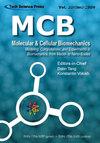Epigenetic Modulations Induction Using DSCR1 Ectopic Expression in Breast Cancer Cells
Q4 Biochemistry, Genetics and Molecular Biology
引用次数: 0
Abstract
Today, prognosis, diagnosis and treatment of cancers are progressing with non-invasive methods, including investigation and modification of the DNA methylation profile in cancer cells. One of the effective factors in regulating gene expression in mammals is DNA methylation. Methylation alterations of genes by external factors can change the expression of genes and inhibit the cancer. In the present study, we investigated the effect of down syndrome critical region 1 gene (DSCR1) ectopic expression on the methylation status of the BCL-XL, ITGA6, TCF3, RASSF1A, DOK7, VIM and CXCR4 genes in breast cancer cell lines. The effect of DSCR1 ectopic expression on cell viability in MCF7, MDA-MB-468, MDA-MB-231 and MCF10A cell lines was evaluated using MTT assay after the cells treated by lentivirus vectors harboring DSCR1 for 72 hrs. Methylation status of BCL-XL, ITGA6, TCF3, RASSF1A, DOK7, VIM and CXCR4 genes in breast cancer cell lines was assessed by Restriction Enzyme PCR (REP) method. Also, methylation changes of these genes in breast cancer cell lines after treatment by lentivirus vectors harboring DSCR1 for 7 days were analyzed by REP method. To confirm the effect of DSCR1 on methylation of genes, Real-time PCR was performed. The MTT assay results indicated that DSCR1 ectopic expression reduced cell viability in all three human breast cancer cell lines. Our results showed that DSCR1 ectopic expression after 6 days reversed the hypomethylation status of the BCL-XL, ITGA6, TCF3, VIM and CXCR4 genes and hypermethylation of RASSF1A and DOK7 genes. The expression levels of BCL-XL, ITGA6, TCF3, VIM and CXCR4 mRNA significantly reduced (P<0.05) and the expression levels of RASSF1A and DOK7 mRNA significantly increased (P<0.05). Our findings reveal for the first time the impact of DSCR1 ectopic expression on the methylation status of breast cancer cells and identify a novel agent for epigenetic therapy.乳腺癌细胞中DSCR1异位表达的表观遗传调控诱导
今天,癌症的预后、诊断和治疗正在通过非侵入性方法取得进展,包括研究和修改癌细胞中的DNA甲基化谱。DNA甲基化是调控哺乳动物基因表达的有效因素之一。外部因素对基因的甲基化改变可以改变基因的表达,从而抑制肿瘤的发生。在本研究中,我们研究了唐氏综合征关键区1基因(DSCR1)异位表达对乳腺癌细胞系BCL-XL、ITGA6、TCF3、RASSF1A、DOK7、VIM和CXCR4基因甲基化状态的影响。在MCF7、MDA-MB-468、MDA-MB-231和MCF10A细胞系中,采用MTT法检测DSCR1异位表达对细胞活力的影响。采用限制性内切酶PCR (REP)方法检测乳腺癌细胞系BCL-XL、ITGA6、TCF3、RASSF1A、DOK7、VIM和CXCR4基因的甲基化状态。用REP方法分析了DSCR1慢病毒载体作用7天后乳腺癌细胞株中这些基因的甲基化变化。为了证实DSCR1对基因甲基化的影响,我们进行了Real-time PCR。MTT分析结果表明,DSCR1异位表达降低了所有三种人乳腺癌细胞系的细胞活力。我们的研究结果显示,DSCR1异位表达6天后逆转了BCL-XL、ITGA6、TCF3、VIM和CXCR4基因的低甲基化状态以及RASSF1A和DOK7基因的高甲基化状态。BCL-XL、ITGA6、TCF3、VIM、CXCR4 mRNA表达量显著降低(P<0.05), RASSF1A、DOK7 mRNA表达量显著升高(P<0.05)。我们的研究结果首次揭示了DSCR1异位表达对乳腺癌细胞甲基化状态的影响,并确定了一种新的表观遗传治疗药物。
本文章由计算机程序翻译,如有差异,请以英文原文为准。
求助全文
约1分钟内获得全文
求助全文
来源期刊

Molecular & Cellular Biomechanics
CELL BIOLOGYENGINEERING, BIOMEDICAL&-ENGINEERING, BIOMEDICAL
CiteScore
1.70
自引率
0.00%
发文量
21
期刊介绍:
The field of biomechanics concerns with motion, deformation, and forces in biological systems. With the explosive progress in molecular biology, genomic engineering, bioimaging, and nanotechnology, there will be an ever-increasing generation of knowledge and information concerning the mechanobiology of genes, proteins, cells, tissues, and organs. Such information will bring new diagnostic tools, new therapeutic approaches, and new knowledge on ourselves and our interactions with our environment. It becomes apparent that biomechanics focusing on molecules, cells as well as tissues and organs is an important aspect of modern biomedical sciences. The aims of this journal are to facilitate the studies of the mechanics of biomolecules (including proteins, genes, cytoskeletons, etc.), cells (and their interactions with extracellular matrix), tissues and organs, the development of relevant advanced mathematical methods, and the discovery of biological secrets. As science concerns only with relative truth, we seek ideas that are state-of-the-art, which may be controversial, but stimulate and promote new ideas, new techniques, and new applications.
 求助内容:
求助内容: 应助结果提醒方式:
应助结果提醒方式:


